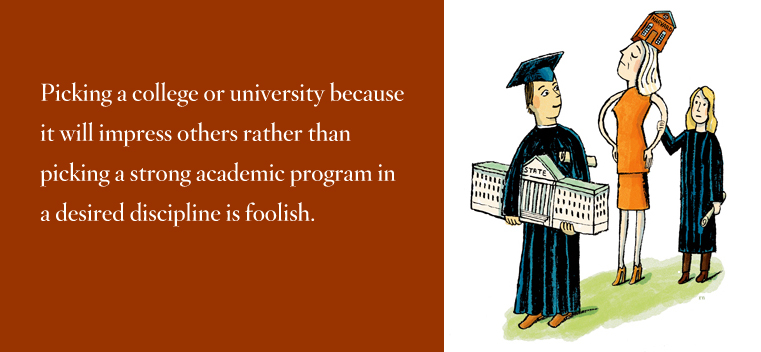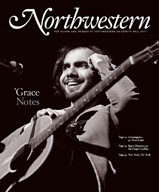
College Shopping
Julie Tresnak Dietz (SESP88) is a professor of health studies and an academic adviser at Eastern Illinois University. She and her husband have three children and live in Sigel, Ill.
Northwestern magazine is looking for Northwestern alumni who would like to write for Purple Prose, the 800-word personal essay that appears in every issue. If you'd like to contribute a Purple Prose, check out the submission guidelines.
Find Us on Social Media
One day several years ago I was talking with my mother about a woman with whom I had gone through school. She had been married the year before in a huge, elaborate wedding that was the social event of the season in my hometown. Eight bridesmaids, eight groomsmen, hundreds of balloons. The whole enchilada.
I was stunned when my mother remarked that this woman was now divorced. “What happened?” I asked. “They haven’t even been married a year.”
“Well,” my mother said, “I guess they spent too much time planning the perfect wedding and not enough time planning their marriage.”
Recently I was reminded of this conversation while speaking to the guidance counselor at my children’s high school. A gathering of the senior class parents had degenerated into a massive “Where is your son going next year?” and “Has your daughter had her Harvard interview yet?” competition. The counselor was frustrated with the snobbishness and nastiness and concerned about the effects on the students. It wasn’t parents bragging about their children, proud of their accomplishments. It was parents denigrating and demeaning the choices other parents’ children were making.
The competition was on, and anyone’s child not interviewing or getting accepted at an Ivy League school was obviously an inferior specimen.
The parents of a student who was planning to attend a nationally ranked academic program at a school in Chicago were told, “You must be so disappointed.” The mother was so shocked she didn’t even know how to respond. Another student who had been offered multiple scholarships to attend one of the top three materials engineering programs in the nation, as well as accepted into the freshman honors program and promised several paid co-op experiences, was sneered at for going to a mere “state school.”
Of course, those parental sentiments filtered down to the students. One student who received a full-ride scholarship to a local community college with the promise of direct matriculation into an excellent program at the state flagship university was terrified to even let it be known among her peers that she wasn’t attending a four-year school right out of high school. Attending a community college, regardless of the obvious financial advantages, was simply not acceptable. When she finally shared her decision with a group of juniors she was mentoring through the college research process, one student told her, “Wow. I could never go to a community college. I don’t have your courage.”
It would be amusing if it weren’t so sad. Parents didn’t ask other parents about what their respective children planned to study or about how strong that program was at the specified school. Nope. The name of the institution meant more than the type and quality of the academic programs involved. While a school such as Harvard is incredible, if the student is most interested in learning about sustainable agricultural practices so she can join the Peace Corps and work overseas, Harvard isn’t going to be very helpful.
And what about the students who are undecided about what they want to study? A number of the students in my son’s graduating class were heading off to school with not an inkling of a possible major. But that didn’t seem to matter because they were going to a “good” school. Just because a college or university is No. 1, 2 or 3 in the U.S. News & World Report rankings doesn’t guarantee it is strong in all disciplines or that it offers a wide variety of program options. Being at a “good” school doesn’t necessarily help that student, and what happens if, when he finally figures out what he wants to do with the rest of his life, the school doesn’t offer anything remotely related to that discipline?
It’s just … backward. Shopping for a particular school first and then trying to pigeonhole the student involved into the available programs makes no sense. Picking a college or university because it will impress others rather than picking a strong academic program in a desired discipline, or a school that offers strong programs in many interest areas, is … foolish. And juvenile. And, as parents, we owe it to our children to put our egos aside and do what is in their best interests.
It’s like taking so much time and effort to plan the wedding that you don’t look past it to think about the marriage that will follow. The wedding is just the beginning of the journey, and if you’ve picked the wrong person, it doesn’t matter how beautiful the ceremony, how perfect the venue or how incredible the gifts received. It’s not the right fit.



 Facebook
Facebook Twitter
Twitter Email
Email


